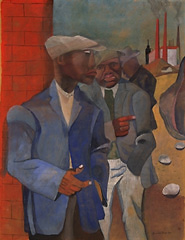Curriculum Materials: Art in America
|
|
Image 22 Romare Bearden Questions: |
Think Questions Teacher Answer Key
1. How do you think these men are feeling? What in the painting makes you think so? Why might Bearden have shown them this way? Why might he have chosen not to show them actually working in the factory?
2. Why did Bearden include the factory in this picture? (To give more information about the situation; to show that these men are factory workers.) Why did he place the factory in the BACKGROUND, rather than closer to the viewer? (Because it was more important to emphasize the personalities of the men.) Why did Bearden use ORGANIC forms and subdued colors to describe the men, and GEOMETRIC forms and starker colors for the factory? (To emphasize the human quality of the men and the dehumanizing quality of the factory.)
3. Bearden's STYLE is called SOCIAL REALISM. Discuss the words "social" and "realism." What do you suppose this term means? Based on this painting, what characteristics might you guess make a work of art social realist? (Social-realist art is concerned with people, specifically workers.) Art that made social commentary was popular during the Depression of the 1930s and throughout World War II. Why do you think this was so? To help answer this question, compare Alexander Calder's mobile Ahab to Bearden's painting. Consider: Which one would be more relevant or readily understandable to a larger population? Which one tells more about the concerns of the times?
4. Romare Bearden painted this picture with GOUACHE on paper to illustrate a magazine article. Do you consider illustration a form of art? Why or why not? If you had to pick a favorite illustration, what would you pick? Do you consider your favorite illustration a work of art? In your mind, what makes or would make an illustrator an artist?
5. Compare Bearden's Factory Workers to
Dorothea Lange's Migrant
Mother and Clementine Hunter's
The Wash. What can you tell about the workers in
each picture? Do you think these artworks dignify the
workers? Why or why not? Which of the images seems the most
personal? Why?
|
|
